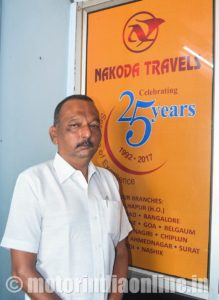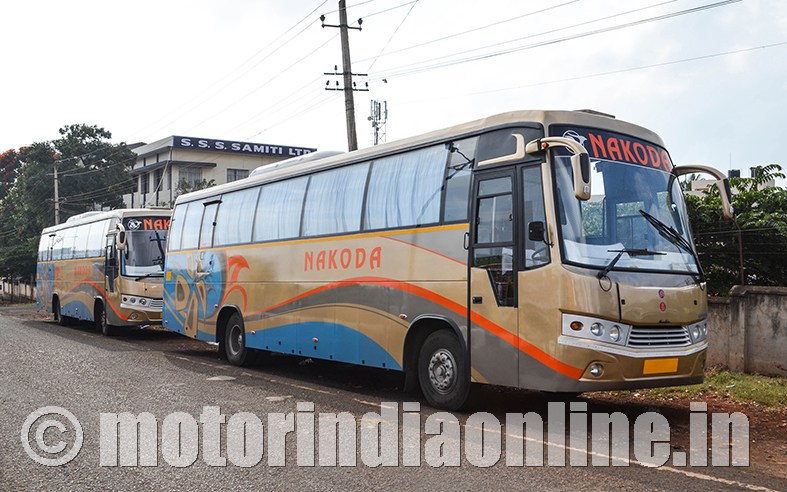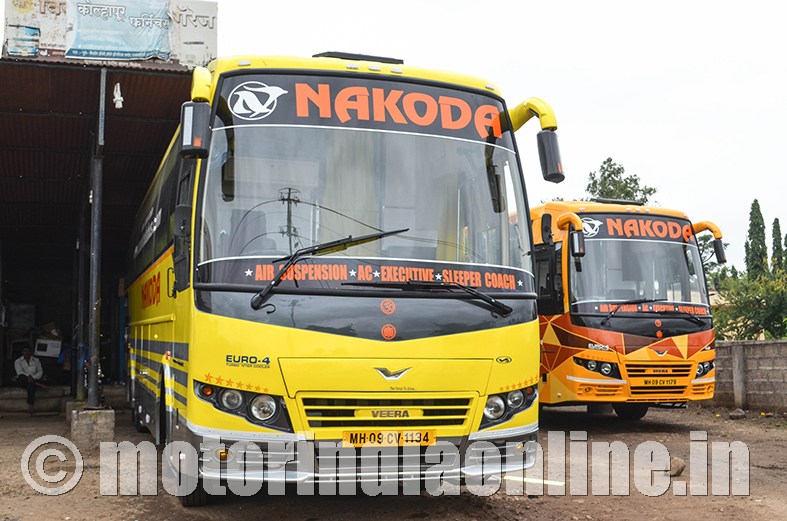Nakoda Travels is one of the most sustainable bus fleet operators from South Maharashtra. Headquartered in Kolhapur, it has web routes spread across major metros in South-Western India. MOTORINDIA spoke to Mr. Pradeep Rathod, Managing Director, Nakoda Travels, at its head office on the occasion of the company’s Silver Jubilee celebration year.
Speaking about his initial entrepreneurial journey, Mr. Pradeep said: “I started Nakoda Travels in 1992 with the support of three partners. The bus services of the company commenced with two Eicher buses on the Kolhapur – Pune route. In 2000, I started the company’s booking office in Kolhapur. Today, after 25 years of dedicated service to the people, Nakoda Travels has a fleet of around 20 luxury buses connecting Kolhapur with Bengaluru, Hyderabad and Mumbai. We have also connected Pune with Belagavi and Hubballi in Karnataka”.
Nakoda Travels was the first operator in Maharashtra to introduce sleeper buses, and still it retains its status as of one of the dedicated and sustainable bus fleet operators from the region. With a quick flashback to the start of his journey, the MD says: “I started with the business of selling tractor parts. In 1988, I learnt that the Central Motor Vehicle Act was amended so as to issue bus permits. In 1989-90, I made up my mind to start my bus fleet operator business. In 1992, I started Nakoda Travels as a partnership venture. Completing 25 years of service to the people, Nakoda Travels has by now built a goodwill and trust for its service”.
The company has upgraded its operation from time to time. It introduced amenities like GPS tracking for passengers and Wi-Fi services onboard its buses. With an expanding fleet, the company maintained its own garage facilities for its buses for scheduled maintenance, like oil-change, greasing and tyre pressure check-up.
He said: “The Bus Body Codes will improve vehicle safety by regulating the norms of bus body building with specified technical and safety standards. I feel the standardization will improve bus body designs and bus body fabrication, resulting in improvement in quality and safety. This will eventually lead to closure of many roadside bus body builders who haven’t been adhering to the bus body building norms, thus compromising on quality of the bus design and safety standards. For sleeper buses, AIS 119 will define a better standard of building berths with respect to their dimensions and the number allowed in a sleeper coach”.
As regards future expansion plans, Mr. Pradeep showed interest in venturing into the premiere segment of Volvo and Scania multi-axle buses in the near future. He stressed the importance of proper driver and crew training as well as of crew instructions being given to maintain hospitality on board the buses.
“We have formed special teams at our office who deal with customer queries and complaints with regular follow-ups. We have also been improving our service on the customer and operation front. New routes have been added keeping in mind factors like profitability of the route, public feedback and self-survey results. The self survey includes road survey and availability of hotels and bio-breaks during the bus journey. The passenger flow is also being considered while planning a new route”, he added.
On the current scenario of bus fleet operators in Maharashtra in terms of service and maintenance, Mr. Rathod felt the need for a central core committee or a council with due representation for fleet operators. Private bus fleet operators face a lot of problems in terms of improper road tax across India. A central committee formation in the State will help in identifying the core issues faced by the operators, which will reduce the burden and improvise the growth rate in terms of proper revenue generation in the bus industry and overall development.
Terming the constitution of the Bus Operators Confederation of India (BOCI) as a positive step, Mr. Pradeep observed: “The formation of BOCI will promote safe, smart and sustainable integrated transport solutions to the general public. Prawaas 2017 held at Mumbai in July can be termed a first step towards creating a unified platform for all bus fleet operators to prepare a road map for the future in terms of services and meeting the challenges faced by the bus industry as a whole. The event, organized on a national level, brought all operators together to explore the opportunities of growth and enable B2B dialogue, thereby paving the way for future ventures and business possibilities within the industry. The International Conference at the event proved to be a forum for deliberating the future of road transport. Topics like ‘Contribution of Bus Industry in developing tourism in India’, ‘Emerging Opportunities in multi-modal integrated transport solutions’ and ‘Developing PPP models for public transport’ provided deep insights into the possible future strategies.”
As for boosting tourism, Mr. Pradeep expressed the view that Maharashtra has the potential to include promotion of tourism as part of fleet operator business. If package-tours for popular destinations like Konkan and Mahabaleshwar can be utilized properly, it will certainly result in growth of revenue for bus fleet operators.
Stressing the need for investments in development of road infrastructure in Maharashtra, he felt that good roads will not only improve end-to-end road transportation with respect to the bus industry, but will also trigger general growth in terms of trade and commerce.
Asked about his views on developing an innovative PPP model for bus fleet operator business in the State, Mr. Pradeep said: “Public – private partnership in this business should only be promoted if at all the private fleet operator gets good revenue. There are many challenges faced by a private operator. So I feel the Government should first solve the problems and initiate a process of making a uniform and viable taxation policy across the country. Once the issues are solved, there will be a better understanding between the public and private firms on a PPP platform. Without solving such issues, the private fleet operator may incur loss. In the current scenario, I feel PPP implementation in bus fleet operation will not be sustainable for long-term stability”.
The MD further said that GST has not affected the passenger fares of non-AC buses, but online bus booking will now attract additional tax. The cost of transport and logistics has gone down. This will regulate the supply chain management.
Concluding on a positive note, Mr. Rathod said: “It was in 2008 that I was honoured with the ‘Best Businessman Award’ by the Maharashtra Journalist Foundation, Pune, at an event held in Mumbai. But, apart from business, I feel that it’s the goodwill in the industry that has helped me to grow with time. I forecast a good future for my company. With my plans of adding new routes with new premium coaches in the near future, I am quite optimistic of Nakoda Travels surging ahead and achieving new milestones in the years to come”.
Mr. Pradeep Rathod, Managing Director, Nakoda Travels
In 1992, I started ‘Nakoda Travels’ with partnership venture. Completing 25 years of service to people, today Nakoda Travels has built a good will and trust for its service to people.
NAKODA TRAVELS STATS :
Founded in 1992
Number of buses in fleet : 20
Longest route operated at present : Kolhapur to Bangalore (600 Kms)
Distance covered everyday : 9000 kms
Passengers carried daily : 450
Schedules per day : 9
Workforce : 80



